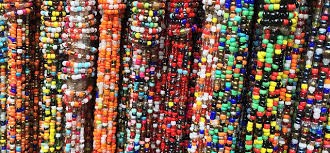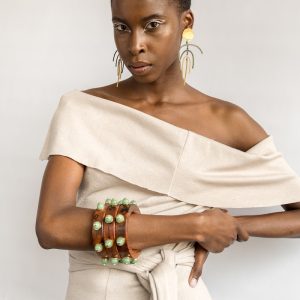Sparkle and Stories of African Jewelry
For centuries, Africa has been a treasure trove of natural resources, materials, and cultural riches, sought after by empires and artists alike. From the intricate beadwork of the Maasai tribe in Kenya to the brass and gold craftsmanship of the Yoruba people in Nigeria, African jewelry tells a story of tradition, identity, and spirituality.
Beyond mere decoration, African jewelry carries a profound cultural significance deeply rooted in tradition. Since ancient times, it has served as a marker of social status, religious affiliation, and cultural identity. Each piece is meticulously crafted, featuring symbols and motifs that convey specific meanings, identities, and narratives.

Take, for instance, the beaded jewelry worn by the Maasai tribe, which not only expresses their cultural identity but also signifies marital status, age, and social position. Adorned with intricate designs and vibrant colors, these pieces pay homage to the tribe’s customs, ceremonies, and beliefs, serving as a visual testament to their rich heritage.
Religious and spiritual values are also deeply intertwined with African jewelry, with many pieces reflecting ancestral beliefs and practices. Materials such as cowrie shells are used as symbols of protection, fertility, and riches, serving as a connection to the spiritual world and ancestral heritage.

During important life events such as birth, marriage, and death, elaborate jewelry plays a central role in African ceremonies, symbolizing love, commitment, and the bonds of community. Young girls adorned with brass necklaces and waist beads during initiation ceremonies in the Senufo culture of Côte d’Ivoire represent their transition into womanhood, celebrating their journey with grace and beauty.
In African weddings, jewelry takes on added significance, exchanged as a token of affection, fidelity, and social standing. In the Yoruba culture of Nigeria, the groom presents the bride with beautiful beadwork known as “ileke,” symbolizing their union and her new status as his wife.


While traditional craftsmanship remains at the heart of African jewelry design, contemporary designers are embracing innovation and modern aesthetics, blending conventional methods and materials with contemporary trends. Designers like Adele Dejak from Nigeria are using reclaimed brass and eco-friendly supplies to create unique pieces that appeal to modern buyers while maintaining a connection to tradition.

Moreover, designers like Ami Doshi Shah from Kenya infuse traditional African themes and proverbs with modern aesthetics, capturing the spirit of African culture and history in their designs. By blending traditional materials with recycled metals and glass, these designers are not only preserving cultural traditions but also embracing sustainability and environmental consciousness.
As we celebrate the beauty and cultural significance of African jewelry, let us also recognize the talented artisans behind these magnificent creations. Their dedication, skill, and passion are a testament to the richness and diversity of African culture, inspiring us all to embrace our heritage and celebrate our shared humanity through the art of jewelry.